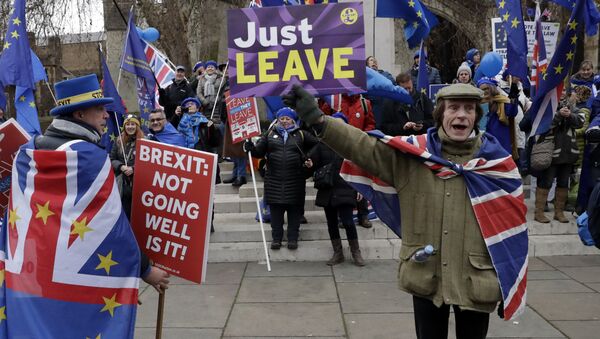The UK Labour Party has pointed the finger at Prime Minister Boris Johnson after he accused it of trying to “fiddle” a Final Say referendum on Brexit by allowing British residents of EU nationality to vote in it.
“Your manifesto sets out plans to fiddle your second referendum on Brexit. You want to give two million EU nationals the vote in your referendum. This is a sly attempt to undermine the result of the 2016 referendum, and is profoundly undemocratic,” Johnson wrote in a letter to Labour Party leader Jeremy Corbyn.
The UK Prime Minister suggested that if the EU nationals are allowed to cast ballots, this would alienate the millions of Remain voters and “undermine the result of a democratically expressed vote”.
Laura McAllister, professor of public policy at the Wales Governance Centre at Cardiff University, has described UK Prime Minister Johnson’s second referendum-related accusations as “the latest intervention on the issue which has quietly dominated this General Election campaign, Brexit.”
She said that the event is “unusual in a few respects” given that first and foremost, “it has come from [Jeremy] Corbyn and Labour”.
“This is different in that Labour has sought to deflect attention away from Brexit on to territory that is regarded as much more favourable to it - that is the NHS [National Health Service], education, public depending levels, nationalisation of key public services etc.,” she argued, calling Corbyn’s stance on Brexit as “consistently ambiguous”.
McAllister asserted that Labour remains “vulnerable on the issue” because “the public seem to have found it confusing, whilst many feel it lacks credibility”.
“Therefore, this issue of changing the franchise for a potential second referendum is interesting. There is a strong argument to say this is a forward-thinking, inclusive mechanism as it allows foreign nationals working here to have a stake in their future and that of their families. Of course, the Conservatives know that most of these potentially newly enfranchised voters would vote Remain in such a referendum,” she concluded.
Dr. Nikos Skoutaris, Associate Professor in European Union Law at the University of East Anglia and an expert in conflict resolution, for his part, recalled that the UK election law “already allows some EU citizens to vote in national electoral events including the 2016 Brexit referendum.”
Additionally, Maltese and Cypriot residents in the UK can cast ballots in Westminster elections, while EU citizens residing in Scotland were allowed to vote in regional electoral events such as the Scottish Parliament elections and the 2014 independence referendum.
Skoutaris said that the goal of Labour’s proposal of is “to extend and expand this already existing franchise” which he claimed is based on the “strongest normative argument” that “Brexit influences the lives of EU citizens living in the UK and UK citizens living in the EU the most”.
“At the same time, such a move if it is coupled with a win of Remain would raise certain questions of legitimacy of the result given that the franchise will be different and can potentially exacerbate the already existing societal cleavages,” he argued.
About 3.3 million people from across the EU living in Britain were denied the right to vote in the 23 June 2016 referendum, along with some 700,000 UK citizens who have lived outside the UK for 15 years or more. Many critics argued that if the EU nationals and expats had actually cast their votes, it would have swayed the result in favour of Remain.




